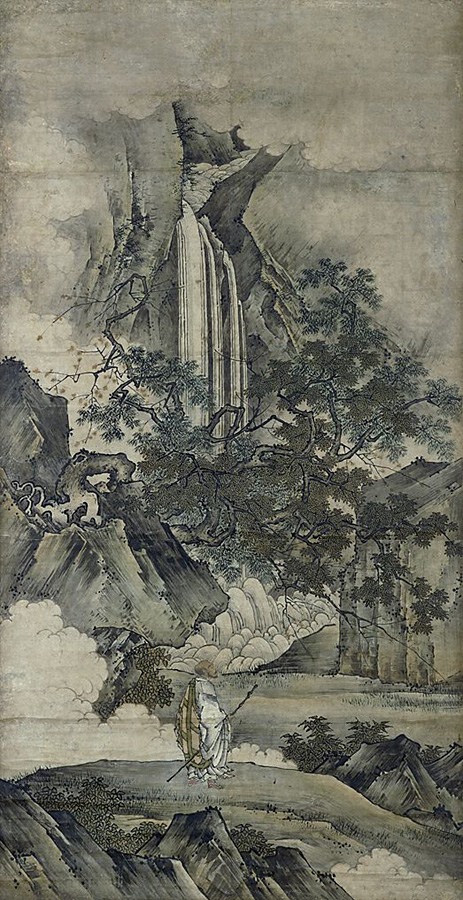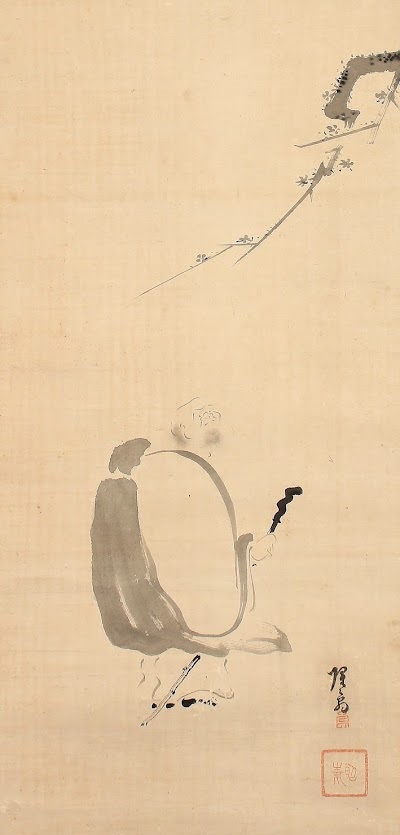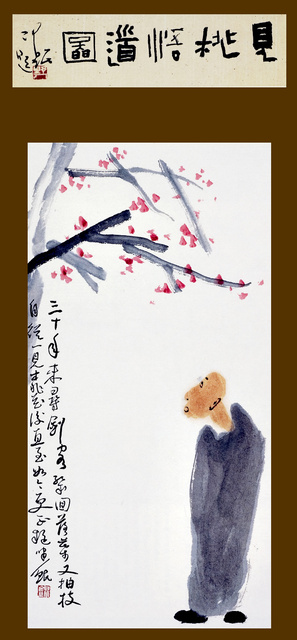ZEN MESTEREK ZEN MASTERS
« Zen főoldal
« vissza a Terebess Online nyitólapjára
霊雲志勤 Lingyun Zhiqin (n.d.), aka 霊雲観桃 Lingyun Guantao
(Rōmaji:) Reiun Shikin, aka Reiun Kantō
(Magyar:) Ling-jün Cse-csin

Painting by 狩野元信 Kanō Motonobu (1476-1559)
From
After Many Autumns, Buddha's Light Publishing, 2011
Translated by John Balcom
Little is known of Master Lingyun Zhiqin, as his poem and the details of his life have come to us through inclusion in several significant collections of gongans. He is said to have been a student of Master Dawei Lingyou. His poem, “Searching for a Sword for Thirty Years,” recalls his attainment of enlightenment upon seeing peach blossoms.
Searching for a sword for thirty years—
Many times the leaves have fallen to sprout anew.
Following one glance at a peach blossom,
I no longer have any more doubts.

Attributed to 松花堂昭乗 Shōkadō Shōjō (1582-1639)
LINGYUN ZHIQIN
Translated by Andy Ferguson
In: Zen's Chinese Heritage: The Masters and Their Teachings, Wisdom Publications, 2000,
pp. 183-184.
LINGYUN ZHIQIN (n.d.) was a disciple of Guishan Lingyou. He came from the ancient city of Changxi in Ben Province (now the city of Xiapu on the coast of Fujian Province). He gained enlightenment when he saw a peach tree in bloom. He then composed a verse that gave evidence of his awakening. The lamp records offer this account.
When Lingyun saw the peach blossoms, he composed a verse:
For thirty years I've sought the swordsman.
Many times the leaves have fallen, the branches bare.
After seeing the peach blossoms,
Never doubting again.Guishan read Lingyun's verse and questioned him. He then confirmed Lingyun's enlightenment, saying, “Those who arrive due to conditions never fall away. From now on uphold and sustain it.”
…
Zen master Lingyun entered the hall and addressed the monks, saying, “Among you there are persons with various strengths and weaknesses, but you should all observe the vegetation of the four seasons, the leaves falling and the flowers blooming—events that have gone on for an incalculable eon. The gods, humankind, all the realms of existence—earth, water, fire, and wind—all of these things come to completion and pass away in the cycle of existence. But when all of cause and effect is exhausted and the nether realms are finished, still throughout the universe not a single hair will have been created or taken away. There remains only a fundamental numinous consciousness that is eternal.
“No matter where it is that those of high ability permanently abide with their good companions of the Way, and make this truth evident by renouncing the world, that place is where Dharma is revealed. Those of middling and low ability who remain ignorant, unable to realize illumination, they remain submerged in the three realms and in transmigration through life and death.
“Shakyamuni Buddha provided a teaching to evidence this truth for gods and humanity, revealing the path of wisdom. Can you understand it?”
…
A monk asked, ”How can one escape from birth, old age, sickness, and death?”
Lingyun said, ”The green mountain is fundamentally unmoving, but the floating clouds pass back and forth.”…
A monk asked, ”At the time the emperor emerges, then what?”
Lingyun said, ”Outside there's a luminous springtime. Don't ask about Changan City.”...
A monk asked, ”How can one gain an audience with the emperor?”
Lingyun said, ”The blind crane dives into the clear pond. Fish scatter from its feet.”...
A monk asked, ”What is the great meaning of our school?”
Lingyun said, ”The donkey's matters are unfinished, yet the horse's affairs arrive.”
The monk said, ”I don't understand.”
Lingyun said, ”Spectacles happening every night, but the essential spirit seldom met.”...
From
Entangling Vines, Wisdom Publications, 2013
Translated by Thomas Yūhō Kirchner
宗門葛藤集 Shūmon kattōshū
Case 8: 靈雲見桃 Lingyun Sees Peach Blossoms
福州靈雲志勤禪師、 因見桃花悟道。有頌云、三十年來尋劍客、幾囘 葉落又抽枝。自從一見桃花後、直至如今更不疑。後擧似潙山。山 曰、從縁入者、永不退失。汝善護持。玄沙聞云、諦當甚諦當、敢保 老兄猶未徹在。雲門云、 說甚徹不徹、更參三十年。後來、大川濟和 尚上堂、僧出擧前頌問、大川答云、作賊人心虛。
Lingyun Zhiqin of Fuzhou was enlightened upon seeing the blossoms of a peach tree. In a verse he said:
For thirty years I sought a sword-master.
How many times have leaves fallen and new buds appeared?
But ever since seeing the peach blossoms,
From then till now I have never doubted again!
Later he related this verse to his master, Guishan Lingyou ( 潙山靈祐 771-853). Guishan said, “Those who enlighten through circumstances never regress. Take good care of yourself!”
When Xuansha Shibei heard about this, he said, “Lingyun may well have been right, but I'll guarantee that his understanding was incomplete.”
Wuzu Fayan said, “You talk of complete and incomplete? Thirty more years of training!”
Later, during a lecture, a monk asked Dachuan Puji about the verse. Dachuan said, “A thief has no peace of mind.”
From
正法眼藏第六十三 Shōbōgenzō, Book 63
發菩提心 Bringing Forth the Mind of Bodhi (Hotsu bodai shin)
by
[永平] 道元希玄 [Eihei] Dōgen Kigen (1200–1253)
Translated by Carl Bielefeldt
https://web.stanford.edu/group/scbs/sztp3/translations/shobogenzo/translations/hotsubodaishin/pdf/supplemental.pdf
“Plum blossoms” (tōke 桃華): Lingyun's poem in expression of his understanding at the sight of plum blossoms occurs in many Chan collections (see, e.g., Dahui's 大慧, Zhengfayanzang 正法眼藏, ZZ.118:36b14-17), including Dōgen's own shinji Shōbōgenzō (DZZ.5:206, no. 155). Dōgen recounts the episode in his Shōbōgenzō keisei sanshoku 谿聲山色 (DZZ.1:277):
靈雲志勤禪師は、三十年の辦道なり。あるとき遊山するに、山脚に休息して、はるかに人 里を望見す。ときに春なり。桃華のさかりなるをみて、忽然として悟道す。偈をつくりて 大潙に呈するにいはく、三十年來尋劍客、幾回葉落又抽枝、自從一見桃華後、直至如今更 不疑。大潙いはく、從縁入者、永不退失。すなはち許可するなり。
The Chan master Lingyun Zhiqin pursued the way for thirty years. Once, while traveling in the mountains, resting at the foot of a mountain, he looked out at a village in the distance. The time was spring, and, seeing the peach blossoms in bloom, he suddenly understood the way. Composing a verse, he presented it to [his teacher] Dawei.
For thirty years, a passenger seeking the sword.
How many times have the leaves fallen and the branches budded?
After once seeing the peach blossoms,
I'm just as I am now without further doubts.Dawei said, “Those who enter from conditions never reverse or lose it.” This was his acknowledgement.
*Dawei Lingyou 大潙靈祐, aka 溈山靈祐 Guishan Lingyou (771-853)
Zen Sand: The Book of Capping Phrases for Zen Koan Practice.
Compiled and translated by Victor Sogen Hori. (Nanzan Library of Asian Religion and Culture No. 4). Honolulu: University of Hawai'i Press, 2003.
Reiun (J.) Ling-yün (Ch.) [Ch’an monk Ling-yün Chih-ch’in (J. Reiun Shigon),
a Dharma heir to Kuei-shan Ling-yu (J. Isan Reiyū), is most remembered for attaining
awakening when he saw peach flowers in bloom. His verse is much quoted in Zen:Some thirty years I sought an expert swordsman.
How many times leaves fell, how many times branches burst into bud!
But from the instant I saw the peach flowers blooming,
From that moment to this I have had no doubts.(Keitoku dentō-roku 11, T 51: 285a; translation from ZD 292)
Reiun Kanka 霊雲観花
http://www.aisf.or.jp/~jaanus/deta/r/reiunkanka.htm
Ch: Ling Yun Guanhua. The Tang dynasty Zen 禅 priest Lingyun Zhiqin 霊雲志勤 (Jp: Reiun Shikin), a disciple of Weishan Lingyou 潙山霊祐 (Jp: Isan Reiyuu), who achieved enlightenment while watching peach blossoms. He composed a well-known verse on the experience. The story is included in the JINGDE CHUANDENGLU 景徳伝燈録 (Jp: KEITOKU DENTOUROKU or "Record of the Transmission of the Lamp", 1004). The screen painting by Kanou Motonobu 狩野元信 (1476-1559) in Daisen'in 大仙院, Daitokuji 大徳寺 (ca. 1513), Kyoto, is the best known example in Japan.

李蕭錕 Li Xiaokun (1949-) festménye
霊雲志勤 Lingyun Zhiqin
versével
「三十年來尋劍客,幾回落葉又抽枝,
自從一見桃花後,直至如今更不疑。」
Viráglátás
Ling-jün Cse-csin megvilágosodás-verse
Terebess Gábor fordítása„Mester kardját kerestem harminc évig,
Hullt a levél, fakadt a rügy hányszor,
Ám barackfa virágát néztem egyszer,
És többé nem gyötör a kétség.”